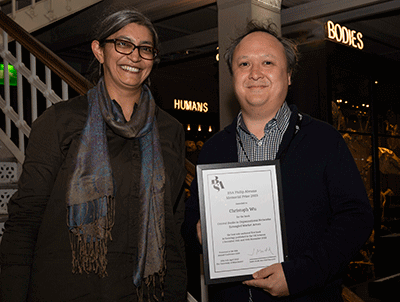A “sophisticated and complex” book that offers new insights into the way that central banks work has won this year’s Philip Abrams Memorial Prize.
Central Banks in Organizational Networks: Entangled Market Actors, by Dr Christoph Wu, won the Prize yesterday [Thursday 13 April].
Dr Wu drew on his prior career in investment management and hedge funds when writing the book, which includes interviews with senior investment professionals and an in-depth look at the quantitative easing programmes of the European Central Bank.
The book shows that social structures shape decision-making and that the sociology of institutions continues to be a necessary part of the discipline.
Dr Wu (below right), of the Norwich Business School, University of East Anglia, was given the award by BSA President, Professor Gurminder Bhambra, at the BSA Annual Conference in Manchester on Thursday (13 April).

Professor Bhambra had the following to say about the book, published by Routledge:
Christoph Wu’s book, Central Banks in Organizational Networks: Entangled Market Actors, is the worthy winner of the 2023 Philip Abrams Memorial prize for the best first book in sociology. It offers an institutional analysis, or analysis of an institution, through the use of mixed methods. It is innovative in its use of social network analysis to examine central bank networks to look at these institutions through a sociological lens. The book is well grounded in the literature on economic sociology, the social studies of finance, and network analysis (including actor network theory). It is a very sophisticated and complex project that triangulates its findings to build its analysis. It is an excellent piece of research, well thought out and executed, and makes a significant intervention across the fields of social studies of finance and organisational sociology.
The book makes a compelling case that social structures shape decision making, and that the sociology of institutions continues to be a necessary and valuable part of the discipline. Wu argues that “central banks are not immune to the social but in fact thrive in it”. He takes a detailed look at the European Central Bank, revealing how this institution is entangled in social, organisational and financial networks, and at how public and non-public communication practices and strategic action influence risk sharing and financial decision making. He shows how imitation, homophily (tendency to associate with similar others) and home-bias shape what banks do in ways that challenge some existing economic thinking. This is an especially timely book in the middle of a further period of banking turmoil and offers encouragement to sociologists to study financial networks and banking organisations to contribute further to this area.
The Philip Abrams Memorial Prize is given each year by the BSA to a researcher’s best first and sole-authored book within the discipline of sociology. It was established in honour of Professor Philip Abrams (1933-1981), whose work contributed substantially to sociology and social policy research in Britain.
The other books shortlisted for the prize were: The Everyday Lives of Gay Men in Hainan: Sociality, Space and Time (Palgrave Macmillan), by James Cummings; and Fighting Identity: An Ethnography of Kickboxing in East London (Routledge), by Amit Singh.


